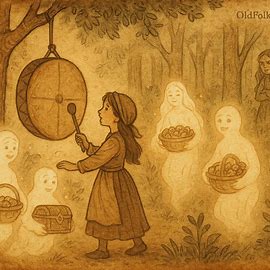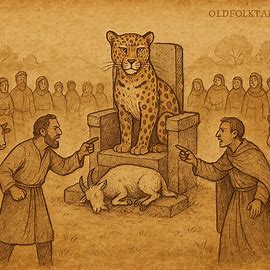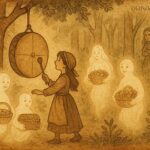Long ago, in a Gambian village, there lived a man known for his arrogance. He adorned himself with weapons and strode about with pride, boasting endlessly of his courage and strength. He claimed there was nothing he feared, neither man, nor beast, nor spirit. Wherever he went, he carried himself as if the world itself should bow to his power. He defied not only his fellow men but even the unseen forces of the bush, declaring that nothing could ever overcome him.
One day, as this proud man wandered, armed from head to toe, he came across something strange. At his feet, from a small hole in the ground, a human head slowly emerged. The sight startled him, but instead of fear, he sneered. The head looked up at him and spoke a single word: “Oh…bot…”—a command that meant it wished to be carried on his back, swaddled and knotted into cloths, just as one would carry a small child.
The man laughed with scorn. “Carry you? A head? Never!” But before he could mock further, the head suddenly rose high into the sky. With terrifying speed, it plummeted down and struck him with such crushing force that he collapsed, believing himself dead. Dazed and trembling, he heard the head’s voice again: “Now carry me.”
Crushed by pain and fear, the man dared not resist. He wrapped the head in his cloths, tied it securely, and lifted it onto his back. That very day, he was on his way to a neighbouring village where his fiancée lived with her family. Bound by the head’s demand, he carried it along unwillingly, his pride shattered by the burden.
READ: Samba and the Magic Bowl | A Gambian Folktale
When he arrived at his fiancée’s home, he quietly placed the head in a corner. He was served food, as was customary for a guest. But no sooner had the dishes been laid out than the head spoke again: “Give me…”
The man had no choice but to share every dish with the head. Each time food was presented, it demanded more, consuming everything until not a morsel was left. Still unsatisfied, it declared, “I am still hungry. Bring me bran.”
Desperate, the man begged bran from his hosts, claiming it was for his horse. He mixed it with water into a thick pap, filling a calabash, which the head devoured greedily. At last, the head fell asleep, its grotesque face resting in the shadows.
Night passed uneasily. Suddenly, the head stirred and commanded, “Take me outside. I must go out.” The man obeyed, but the head shook itself violently. “No, I cannot remain in the open. Take me to the mosque.”
Horror filled the man’s heart. To carry a head into the sacred mosque was unthinkable, a desecration he could never commit. “I cannot,” he protested. But the head rose again into the air and crashed down on him with brutal force. Broken and terrified, he submitted.
Inside the mosque, the head moved straight to the seat of the grand marabout, the revered religious leader of the community. There, in an act of vile disrespect, it defiled the holy place, spreading filth upon the very ground. Exhausted, the man carried it back to a corner of his dwelling, where it returned to sleep.
At dawn, the faithful gathered for prayer. What they saw horrified them: their venerable marabout, helpless and soiled in filth. Anger swept through the village. Shouts and curses rose, demanding to know who had committed such a monstrous offense.
The next day, the marabout summoned all the men of the village to the square. The proud man, his burden hidden beneath his cloth, stood among them. Then the head whispered from within the folds: “Denounce yourself…or else…” Trembling, he confessed: “It was I.”
The people, enraged, turned upon him with sticks and stones. They drove him out of the village, beating him until he stumbled deep into the bush, rejected and dishonoured.
At last, when they were alone, the head spoke once more: “Take me back where you found me.” Broken in body and spirit, the man obeyed. He returned the head to its hole. Then, to his surprise, it gave him back his weapons.
“Go now,” it said. “And remember the head whenever you boast without cause.” With that, it sank back into the earth, leaving the man humbled and forever changed.
Moral Lesson
This Gambian folktale teaches the dangers of arrogance and reckless boasting. Pride blinds the heart and leads to downfall, for those who exalt themselves invite humiliation. The man who mocked fear and strength was forced into disgrace, carrying a burden he could neither control nor resist. True wisdom lies in humility: respecting both the visible and invisible powers of the world.
Knowledge Check
Q1: Who is the central character of this Gambian folktale?
A1: A boastful man armed with weapons who claimed to fear nothing.
Q2: What emerged from the hole in the ground?
A2: A human head that demanded to be carried like a child.
Q3: How did the head punish the man when he refused?
A3: It rose into the air and struck him violently on the head.
Q4: What desecration did the head cause in the mosque?
A4: It defiled the grand marabout’s place with filth, shocking the community.
Q5: Why was the man expelled from the village?
A5: He was forced to confess that he had soiled the sacred mosque, and the villagers punished him.
Q6: What final lesson did the head leave with the man?
A6: To abandon pride and remember the consequences of empty boasting.
Folktale Origin
Source: Wolof folktale, The Gambia, West Africa.







